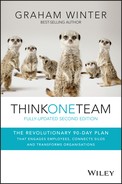chapter 4
the five shares
After a short break, Nick scrawled the words, ‘Five practices to defeat “Three Kingdoms” thinking’ across the whiteboard and underneath wrote ‘Think silos’ and ‘Think one team’.
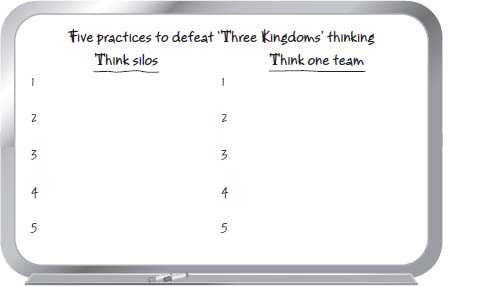
‘Is everyone familiar with O’Donnell’s attempt to launch the green jelly bean last year?’
There were groans, nods and a few laughs all round.
Many years of consulting had taught Nick the art of quickly finding the best in-company examples of Three Kingdoms thinking and it didn’t take too many chats with team leaders and operations staff around the canteen and car park to pinpoint ‘Project Green Jelly Bean’ as the perfect culprit.
Just about everything that could go wrong had gone belly-up with the attempt to launch a fourth jelly-bean colour the previous year. The green jelly bean was described in the national newspaper (with some accuracy) as ‘tasting like cats’ urine’; however, this gave Charles — who enjoyed any chance to strut his stuff in the media — the chance to deny the claims on the Sunday business program. Unfortunately, he met his match in a smart young journalist who enquired how he actually knew what cats’ urine tasted like. Charles’s answer still appears occasionally in television bloopers highlights (and was briefly trending as a top-five hit on YouTube), but the green jelly bean was gone before breakfast the next day and recriminations followed quickly afterwards.
Nick pointed to the whiteboard. ‘There are five fundamental differences between “Three Kingdoms thinking” and “one-team thinking”. Let’s look at what these five differences mean in practice to see if they show why Project Green Bean may have hit the wall.’
big picture or separate agendas?
Nick wrote on the flip chart that stood in the corner next to the whiteboard:
He explained, ‘It’s human nature that people are motivated and aligned to their most important agendas. In too many organisations there isn’t an alignment to a compelling big picture that’s more important than the individual agendas within the “kingdoms”.
‘You see this in places such as universities where every faculty thinks its program is the most important, or in the countless corporate head offices where arrogance is matched only by their ignorance of what things are really like in the field. Think about the thousands of useless bureaucratic rules coming out of head offices and the energy that goes into complying with them, or the wasted money on software that doesn’t work because no-one asked the people who actually do the job!
‘Think about the phone companies, power utilities and banks that you deal with. Do the people you contact in those businesses really know the big picture, or are they just one of the individual parts that don’t know what the others are doing?
‘We often hear the rhetoric about “whole of government” but rarely see two government agencies working together to solve a complex social issue. (Ironically, they do the opposite by competing for budgets for their own agendas.) It’s crazy and very similar to the generals in ancient China who became heroes by destroying each other.
‘When people genuinely “think one team” they all commit to something that they can’t achieve individually but they can achieve collectively. That’s a superordinate goal and it excites people and creates the alignment.’
Nick handed out a sheet with examples of what he called ‘above the line/below the line’ behaviours and then sat at the table and quietly but firmly turned the spotlight on the group.
‘Most of you were a part of Project Green Jelly Bean and if not, I suspect you’ve all had some similar experiences, so please read the handout and then take a pen, make your way over to the flip chart and mark the point between ‘Pursue other agendas’ and ‘Share the big picture’ that you believe characterises teamwork and collaboration between teams at O’Donnell’s.’
They all sat down and looked at the flip chart. Everyone had drawn a mark as far away as possible from ‘Share the big picture’!
meanwhile‥
Once a year Lollies on Parade!, one of Australia’s largest confectionary retailers, decorates each of its twenty Sydney shops for its ‘Into the Blue’ promotion. Blue streamers and balloons, bright blue flags and even a blue carpet announce to the public that there are prizes to be won, including around-the-world travel, new cars (blue of course), hundreds of blue T-shirts and every imaginable type of blue lolly.
In the middle of every shop window a wheel designed to fit O’Donnell’s sapphire-blue jelly beans in its numbered slots gives a stunning visual appearance as it spins and lands on a number that sends a lucky customer ‘Into the Blue’. Tomorrow morning there would be queues stretching along shopping malls across Sydney. Into the Blue is one of the most popular and high-profile promotions in the harbour city.
Everything was ready for the launch except that over the past hour, while trucks were delivering O’Donnell’s jelly beans to the twenty shops, the phone was ringing hot in the office of Tania O’Dea, Head of Marketing for Lollies on Parade! Angry franchisees demanded to know why they had received box upon box of bright red jelly beans to put in their Into the Blue window displays.
A livid Tania gave up trying to contact the O’Donnell’s customer service people or the executives, who seemed to be in endless meetings. Being only a short drive away, Tania soon thundered through O’Donnell’s reception, got directions from a still-smiling Susan, and headed straight into the training room, interrupting Nick’s presentation and throwing everyone into confusion.
Four hours later, after turning the place upside down, the first run of sapphire-blue jelly beans made its way along the production line and into the waiting trucks.
‘It’s amazing what we can do when there’s a crisis’, commented Team Leader Sally as her blue team kept check on the line and corrected some minor temperature issues in the extruder. It was all hands on deck with even a few Research and Development people helping on the line to fast cook the beans and check quality.
Mike drifted past in the background, wary of not getting caught in the crossfire between Purchasing and Operations. He could have stopped them from cancelling the order for blue colouring this week, which could have prevented the problems with Lollies on Parade! but usually customers put up with errors in orders and, in any case, his performance review was due next week and the savings would ensure that he hit his financial targets. And that, as Charles has said or implied many times, is more important than anything else. ‘Maybe I’ll even get a bonus out of this’, Mike mused to himself as he sauntered off to the car park, leaving others to sort out the mess.
Jenny reluctantly postponed the afternoon staff meeting so that the Lollies on Parade! order could be filled.
back in the training room
With the blue production line spilling out sapphire jelly beans, Steve and Jimmy were able to convince a still-fuming Tania that she’d have blue jelly beans spinning in all twenty of her Lollies on Parade! window displays by morning.
When they reconvened in the training room, Nick enquired, ‘How does what we’ve just seen over the past few hours and your experience with Project Green Bean relate to agendas and sharing the big picture?’
‘They’re both perfect examples’, confirmed Jimmy. ‘We have people who think they own the customers, so their agenda is to have control and to keep people out. In Project Green Bean they kept R&D away from the customers and even though the recipe matched all the specifications, people didn’t want to buy green jelly beans because of both the taste and colour. We could have stopped the project and saved millions if only we’d known.’
Emma added, ‘R&D has to share some of that responsibility because our agenda is to make the most technically perfect product. So I guess we’re sometimes less interested in what the customer thinks than what science tells us’.
Ron mused to himself that none of the financial analysts really focused on Project Green Bean because their selective loyalties were to the red, blue and black production teams.
‘That’s an interesting insight’, reflected Nick, ‘and typical of the Three Kingdoms, where they created three governments — all with duplicated roles’.
‘We do that’, chipped in Rick, a Process Improvement Engineer. ‘Each production line has its own accountant, chemist and marketing people, so it’s not surprising that new ideas and best practices fall over because they can’t bust through the silos.’
Judith added, ‘Come to think of it, we actually recruit people to fit our kingdoms instead of the overall business’. It was a double ‘aha’ moment for the HR manager, who had also realised that they recruited for technical skills and gave little thought to whether people were open to ambiguity or the big adaptive challenges.
‘So what should have been the big picture?’ Nick asked.
‘The same as we’ve just seen in the past two hours with the Lollies on Parade! crisis’, replied Jimmy. ‘Everyone aligned and working together to give our customers the O’Donnell’s experience, which means great products and great service.’
Nick was delighted with the team’s energy and insights but knew that he had to keep them firing right through all five practices, so he cut short the discussion, wrote the first practice on the whiteboard and moved on to the second practice.
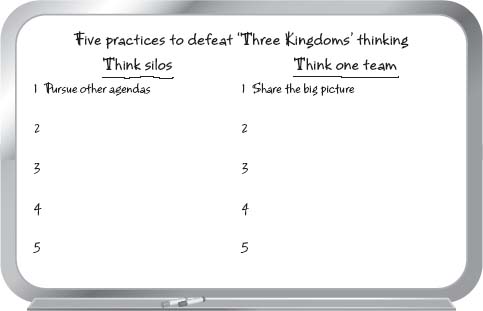
share reality or avoid and deny?
Next Nick showed the team a series of quotes from top performers in the fields of business, sport, emergency medicine and even an Everest expedition.
He paraphrased the common message: ‘High-performing individuals, teams and organisations crave feedback’.
‘Why?’ he asked rhetorically before answering his own question. ‘Because without it they can’t learn and improve the capabilities to achieve their goals.’
He contrasted this with what happens when people think ‘kingdoms’ and compete against each other.
‘You get low trust and it’s much harder to get at the truth. You hear sugar-coated conversations in which people avoid the hard truths and put a spin on things. That means lots of blind spots, which put the business at risk.’
He referred them to the next section of the ‘above the line/below the line’ handout and gave everyone a few moments to reflect on it.
Everyone marked their scores on the flip chart and again all marks were positioned well to the left.
‘Project Green Jelly Bean was a classic example of putting a positive spin on everything instead of calling it like it really was’, ventured Max, the Business Analyst. ‘Every department kept telling us how well its part of the project was progressing but no-one said what they really thought.’
‘Which was‥?’ asked Nick.
‘It was a great product that no-one wanted to manufacture, sell, buy or eat’, replied Tracey, a Sales Team Leader, laughing at how ridiculous this sounded.
Nick knew the answer to his next question but wanted to see if someone was prepared to tell the truth.
‘How did it get that far?’
Ron sighed and gave every indication that he was about to speak. Finally, he broke the silence. ‘Because it was Charles’s idea and no-one had the guts to tell him the truth.’
‘Thanks, Ron’, replied Nick. ‘That’s one of the most honest things I’ve heard anyone say for a long time.’
Ron flickered an embarrassed smile. He wasn’t accustomed to being open in meetings or to having someone praise him in public. With a violently alcoholic father he’d learned at a very young age how to make himself invisible by concealing his emotions. It was a survival technique then and had been more than helpful in navigating the tantrums of the equally dangerous Charles.
Jenny was pleasantly surprised to see Ron’s openness and wondered if perhaps he did have a future at O’Donnell’s after all.
more reality
In the pause that followed, Jimmy decided that the meeting could go no further without sharing the reality of his resignation speech to Charles and his discussion with Jenny.
‘Is it a done deal?’ asked Steve, breaking the uncomfortable silence that followed Jimmy’s admission.
‘Well, it was yesterday’, replied Jimmy. ‘But I’m disappointed with the way Jellicoe Candy Corp handled the whole recruitment process and, to be frank, the main reason I was leaving was because of Charles‥ and now he’s gone.’ He paused and looked at Ron, but decided against commenting on the difficulties that the Head of Corporate Services had created for him.
‘Does that mean you’ll reconsider?’ asked Judith, pressing the point.
‘Please give me until tomorrow. I’ll have a final answer then’, replied the rather ill-at-ease Head of Sales and Marketing, wanting to chat things over with his wife, Limei, before making a final decision.
‘Okay, let’s meet after the staff meeting’, suggested Jenny, expecting him to stay but still not totally confident that he would.
cyb (cover your backside)
As the discussion resumed, Judith reminded everyone that each Friday an HR staffer emptied the quaint suggestion box that had sat for fifty years in the entrance area to the canteen. Over the past six months the two most popular suggestions were to fix the flood of internal emails and for Charles to do something that he would find physically impossible to do.
While the suggestions related to the latter were always discreetly shredded, Gary Fisher, the ever-suffering Network Systems Administrator (a great title for an awful job), had been working for some time on a strategy to stop the email war that was engulfing O’Donnell’s.
Among the suggestions were to add another category to the emails after ‘cc’ and ‘bcc’, so that when people felt the need to copy others on an email they had to decide whether there was a good reason or whether it was just to cover their behinds. Judith’s suggestion that ‘cyb’ be added to the system so people might show some courage by admitting their behind-covering behaviour brought a much-needed laugh to the group.
A few more minutes of sharp discussion and the group had grasped the idea that ‘Share the reality’ was not about blaming but about wanting and actively seeking feedback, being prepared to confront reality and knowing that a certain amount of conflict is healthy.
Nick kept things moving.
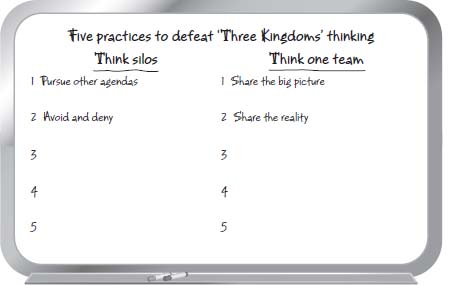
share the air or stifle communication?
In a now-famous moment in the history of Project Green Jelly Bean, the former Head of Operations had managed to convene a sixty-minute meeting attended by fifteen people during which only three (including himself) spoke. Someone remarked later that there were more spectators at that meeting than at Saturday’s national league football game.
Project Green Bean had all the hallmarks of silo mentality at its worst:
- The person with the loudest voice and the most power (or both) dominated meetings.
- There were few if any two-way conversations between the key players.
- Chronic hoarding of information was a feature at every stage.
- Plans were impervious to change, no matter how off-beam they were.
‘We couldn’t get a word in at project meetings and in the end there just wasn’t any point in attending’, commented an exasperated Emma.
‘It was the same for us’, revealed Donna from IT. ‘Everything we suggested hit a brick wall of cynicism so there was no point. To be honest, we just put the project on the bottom of our priority list and nothing got done.’
Jenny was thinking about her own experience in a legal practice in which she had worked earlier in her career. The combination of a rigid hierarchy and personality clashes at most levels had stifled the creativity and energy of new graduates, who either learned to shut up and do what they were told or left to pursue their careers elsewhere.
She recalled that any views that even slightly challenged the status quo were discarded in a way that was probably more habit than intention. The most common phrase at meetings was, ‘Yes, but‥’ and this deflated Jenny, who had been raised to share her viewpoint even if it was challenging to those in authority. She didn’t stay long, but it was a good lesson in how not to run a business.
After a few minutes’ discussion and reflection on the ‘above the line/below the line’ handout the group once again put their marks on the flip chart.
The marks were again pushing hard to the left and everyone could see that O’Donnell’s had lost the openness of communication and sharing of ideas that had characterised its earlier years.
Nick suggested a short break before completing the final two practices.
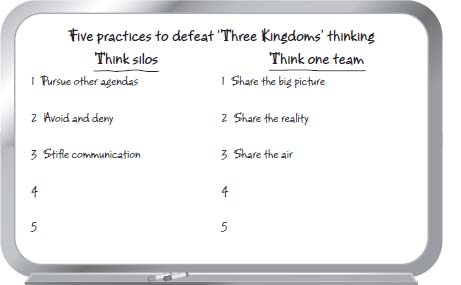
share the load or look after your own turf?
Most of the group used the break to visit the blue production team to see how things were progressing. While they were yet to discuss the fourth practice, ‘Share the load’, it confronted them immediately as they walked into the production area.
Research and Development staff were still there hours after their usual finishing time, people from Sales were helping to seal the special blue packages and maintenance staff from the black team were filling in for yet another person on a fake sickie. Two IT staff members were even arriving with pizzas to feed the troops.
‘Is this how it normally works?’ asked Nick, slightly tongue in cheek.
‘Not likely’, replied Jimmy. ‘On a normal day it’s nothing short of a union demarcation in this place. You get quite good teamwork inside the departments but no-one shares the load outside their areas. They don’t think about it and they don’t know what people do anyway.’
Nick recounted a recent experience with a large engineering firm where the partners and managers made an art form out of not sharing their load across or down through the firm.
They never planned or prioritised together, they made everything much more complicated than it needed to be and no-one ever thought to look left or right from their job to see what was happening along the line.
Clients wore the negative impact of the firm’s silos and took out their frustration on the less senior staff doing the day-to-day work on-site. It wasn’t until the top clients and then the most talented engineers headed for the door that the burning in the partners’ pockets finally forced them to stop looking after their own turf and to share the load (and the big picture).
When everyone had returned to the meeting room, Nick asked them to read the next part of the handout.
After the team had reviewed the behaviours for ‘sharing the load’ they marked their scores on the flip chart.
The marks were again well to the left, but everyone agreed that ‘Share the load’ was much better inside the smaller work teams and departments than across O’Donnell’s.
It was a fair point, and O’Donnell’s was certainly not alone in that regard, but Sam and Eddie’s surfing safari to Coogee Beach was not a good sign. In addition, everyone’s pet hate, the almost compulsory late start to meetings while waiting for colleagues to amble in, was yet another indication that O’Donnell’s had a long way to go to genuinely share the load.
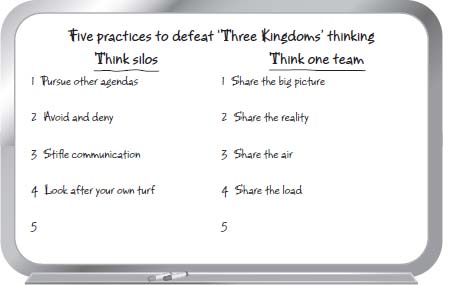
share the wins and losses, or play ‘I win, you lose’?
The final ‘think one team’ practice had been a feature of O’Donnell’s culture since William and Walter shared a quiet drink with their employees every Friday evening to thank them for their efforts and to share the stories of the week.
In those days O’Donnell’s really was one big team and everyone shared the wins and losses.
People still share stories, but more typical was last Friday’s performance at one of the local bars by Jerry Porter, the Deputy Sales Manager known to all as ‘Hippo’ due to his thick skin, huge body and ability to drink more than most of the sales team combined.
As had become the habit on most Friday evenings, the people of O’Donnell’s could be found drinking in their own department teams in any of the four bars within walking distance of the plant.
At the nearest of these drinking holes, Hippo was holding court with the sales team, while off in the far corner the finance team mostly sipped glasses of chardonnay, in contrast to Hippo’s preferred strategy of one pint of beer in the hand and another waiting on the bar.
With a mouth full of beer nuts Hippo began his story in the loudest voice imaginable while the eight members of the sales team perched on their bar stools, eager to hear the latest gossip.
‘You need to keep this quiet’, he bellowed, completely unaware of anything or anyone around him. ‘But our little Jimmy the Sprocket [Jimmy Goh, Sales and Marketing Manager, to others] is fishing for Grisho’s head, and I reckon he might just have hooked up’, he announced to more than a few blank looks.
Hippo sensed that more detail might be needed. ‘Our illustrious Head of Corporate Services and his merry bunch of bean counters have a problem with the budget and they are going to get toasted at the next board meeting.’
He leaned in towards the circle of drinkers as if to share a secret, but without dropping the volume one decibel he announced, ‘R&D are a hundred grand over budget already; we’re two hundred over; and you can only guess what Operations are costing us with all their product screw-ups’. Hippo leaned back dangerously on his bar stool and laughed in a snorting fashion that flushed his already red face, still wind-burned from Wednesday’s corporate golf day, to which he had scammed an invitation from a mate.
The wine glasses sat untouched as the finance team (and the rest of the bar) listened to Hippo’s continuing exposé on the weaknesses, failure and likely demise of all of them. On his fourth pint in thirty minutes and with a fifth waiting on the bar, Hippo was warming to his task as the finance team filed out, leaving Hippo with the last words. ‘Those chardonnay bastards will spread our conversation all over the plant by Monday. You can’t trust ‘em. They’re the enemy, just remember that’, he advised solemnly as he reached for beer number five.
‘A gallon on Friday and you’re set for the weekend’, Hippo always advised his team. He was halfway to his target as the conversation switched to football and the all-important footy pool.
In the training room, Tracey from Sales marked the far left of the flip chart and wryly observed, ‘It’s like that golf saying, “every shot pleases someone”. We’ve become a business in which people take pleasure in watching others fail. It’s crazy’.
Jenny was pleased to hear that Tracey was more engaged in the business than she seemed to be at the time of the airport lounge conversation she had overheard.
O’Donnell’s had lost the ability to share the results of its collective efforts and instead had become a ‘keep your head down’ culture in which any mistakes had to be blamed on someone. ‘I win, you lose’ thinking was rife, particularly at across-the-business meetings such as the dreaded monthly Sales–Operations forum, where seeing someone else get nailed was actually a relief because it meant you were probably safe for another month.
Nick spoke as he added the final practice to the whiteboard. ‘When a silo mentality prevails, no-one shares the overall outcome. Instead of thinking about the business from end to end, people just look at their turf and breathe contentedly when they meet their own KPIs. They compete for resources and for attention and come to see things as win–lose. That absolutely kills the learning loop and puts the business at real risk.’
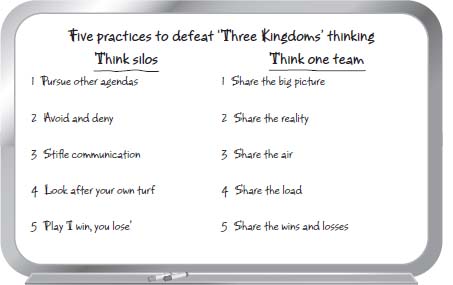
Everyone looked at the whiteboard. ‘We call them the five shares’, said Nick, ‘and they’re the essence of working as one team’.
hopes and squirms
Jenny was thrilled about the rapport that Nick had built with the group and was eager to agree to the next steps, particularly anything that could be included in her presentation at tomorrow’s staff meeting.
‘How do you recommend we move forward, Nick?’ she asked with unmistakable urgency.
Nick had reached this stage many times with teams and was always careful to make sure that the leadership team owned the plan, rather than handing it off to a consultant or transformation unit.
‘A mentor of mine once said that the key to being an effective facilitator is to realise that the answer is in the room.’ He smiled and paused for effect before reinforcing the point. ‘The answer is in the room, and you are the leaders so let’s find it.’
Splitting the group into four sub-teams he gave each the task of identifying what he called their ‘top three biggest hopes and squirms’ for the O’Donnell’s transformation. After a few minutes discussing and creating their lists, Nick asked them to merge into two groups and to repeat the task before finally writing three hopes and three squirms on the whiteboard.
When both groups were ready, he invited Jenny to guide the conversation and to reduce the two lists into just three shared hopes and three shared concerns.
Jenny’s natural style of questioning and facilitating helped the group to easily reach a final list.
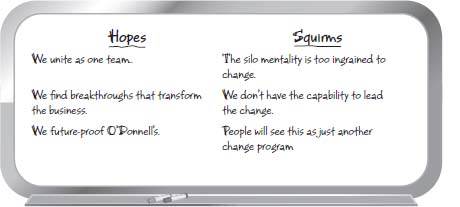
Nick drew up a chair and spoke with genuine care and concern.
‘These squirms are entirely to be expected and, of course, this is an adaptive challenge, not just a technical problem with a straightforward answer so we have to learn our way through this together.’
Nick recognised that the group wanted clear direction, but the inevitable rollercoaster of successes and setbacks that lay ahead also demanded the flexibility to learn and adapt. A traditional one-size-fits-all change management or leadership model just wasn’t suited to this environment. A more adaptive framework and set of tools was needed and in Nick they had the perfect coach to bring that to them.
Nick was clear and confident in describing the way forward.
‘From my experience there are three actions that will build the momentum and set us up for success.
‘First is United Leadership, which starts by getting clear direction and strong collaboration among the Executive Team. We do that in a ninety-day program and then we can cascade the same approach into each divisional leadership team.
‘Second is Leading Collaborative Change, which means getting a shared language and set of tools for change leadership and then embedding that approach across all the flagship change projects.
Third is to engage everyone in O’Donnell’s to get on board with the transformation and that’s the perfect first flagship project. Let’s call it “The Big Jelly Bean Team Project” and the ninety-day deliverable is a transformation plan that’s been co-created with the whole workforce.’
Nick summarised the ‘think one team’ implementation plan on the whiteboard.
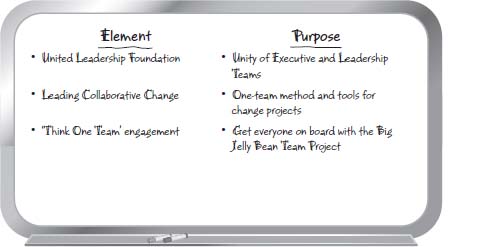
He concluded by handing over to Jenny and suggesting that she use the final half hour to confirm any actions leading up to or following the staff presentation.
He sat back and listened to a conversation sprinkled with the words of united leadership, collaboration, and learning and squirming together.
It was a good sign that O’Donnell’s was again beginning to speak and act as one.
